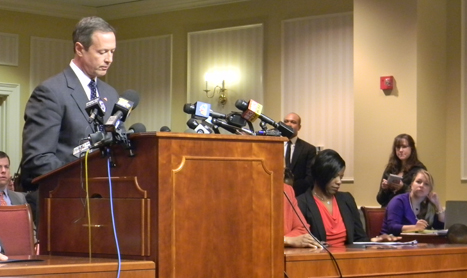By Julia Maldonado and Hannah Anderson
If the bill becomes law, Maryland would become the 18th state to abolish the death penalty.
O’Malley tried, and failed, to outlaw capital punishment during his first term, but this time he appears to have the momentum and the votes.
Last week, two senators confirmed they are in favor of repeal, bringing the number of affirmative votes to 25 — one more than the number needed to pass a bill in the Senate. Early this session, Senate President Thomas V. Mike Miller Jr., D-Calvert, said he would propel the bill out of committee to be debated on the floor if the governor had enough support.
Miller told reporters Thursday that he expects the death penalty bill to be debated in the Senate chamber within a week.
“I think the repeal will pass with a comfortable margin,” Miller said. “I intend to vote against it.”
O’Malley was also expected to testify before a House committee Thursday. Proponents of repeal are optimistic about getting the bill through that chamber.
The governor’s bill would make life without the possibility of parole the highest form of punishment in Maryland, and require the governor to allocate $500,000 of annual savings from the repeal to the Maryland Victims of Crime Fund — devoted to the needs of murder victims’ families.
Currently there are five people on death row in Maryland. Another five have been executed since 1976.
The Chair of the Legislative Black Caucus, Delegate Aisha Braveboy, D-Prince George’s, said Thursday morning that 39 of the 43 members of the caucus support the repeal of the death penalty, adding some of the remaining four were still undecided.
Braveboy said her support of the bill — as well as that of other members of the caucus — is largely based on the findings of the 2008 study by the Maryland Commission on Capital Punishment.
The state-commissioned report concluded that geographic, socioeconomic and racial disparities were prevalent in the application of the death penalty in the state. The study also noted the high legal costs and emotional stress on victims’ families caused by lengthy appeals processes.
During his State of the State address last month, O’Malley referenced the same study, saying the death penalty “cannot be administered without racial bias.”
According to a 2009 study published in the Journal of Criminal Law and Criminology by two University of Colorado professors, 88 percent of the nation’s leading criminologists do not believe the death penalty deters violent crime.
Another repeal attempt in Annapolis failed that year. Instead, the law was amended to restrict death penalty eligibility only to cases where there is DNA evidence, a voluntary videotaped confession, or video of the murder.
Thursday, O’Malley said the 2008 Commission found that 80 percent of Maryland’s death sentences between 1995 and 2007 were overturned.
“There is no such thing as a foolproof death penalty,” O’Malley said. “And there is no way to reverse a mistake if we should execute an innocent person.”
The death penalty has been a divisive issue in Maryland under the past two administrations. Former Gov. Bob Ehrlich, a Republican, was a proponent of the death penalty and lifted an execution moratorium when he was sworn in as governor. He reinstated the death penalty in 2003.
Still, many see the need for the death penalty in Maryland. Among those who testified in opposition of the repeal was Harford County resident Rich Prothero, whose brother, Baltimore County Police Sgt. Bruce Prothero, was shot and killed during a robbery while working as a jewelry store security guard in 2000.
“Certain crimes against our society are just not acceptable,” Prothero told the committee. “They shake your core.”
“The vile acts that man does to one another will not end, and every one of us knows it,” Prothero said. “No matter how judiciously you have to use it, there will always be incidences that warrant the ultimate price.”
Also testifying against the repeal of the death penalty was Baltimore County State’s Attorney Scott Shellenberger. He said the strict evidence requirements necessary to seek the death penalty make Maryland different from other states.
“The rare and selective use of the death penalty shows our collective conscience, and that the use of the death penalty is reserved for the worst of the worst,” Shellenberger said. “The statute you have today ensures that innocent people are not sent to death.”
The governor, though, said “the death penalty does not make us stronger or more secure as a people, nor does the death penalty make our laws more effective or more just.”
“Capital punishment is expensive, it does not work, and I humbly urge you to replace it with life without parole,” O’Malley said.

The Maryland General Assembly has not debated or voted for or against the issue of the death penalty since it was reinstated in 1978.


You must be logged in to post a comment.